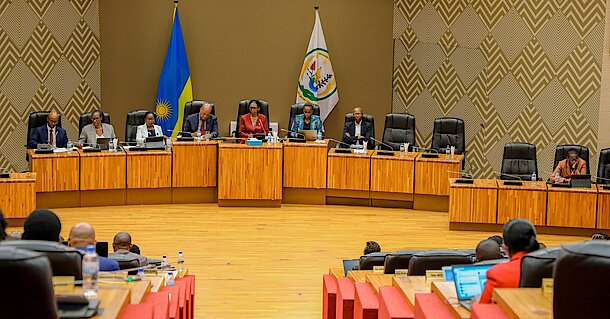
The Minister of Finance and Economic Planning, Yusuf Murangwa, today on behalf of the Government, presented the Budget Framework Paper (BFP), a medium-term guide outlining Rwanda’s macroeconomic and fiscal policy directions for the period 2025/26 to 2027/28.
Guided by national economic policies over the medium term, the budget for fiscal year 2025/26 will align with the medium-term fiscal consolidation path, supporting the implementation of the National Strategy for Transformation (NST2) goals while maintaining public debt at sustainable levels.
Minister Murangwa highlighted that despite various setbacks, Rwanda’s economy remained resilient, achieving a robust growth rate of 8.9% in 2024—exceeding the previously projected 8.3%. This growth was driven by strong performances in the services and industry sectors, as well as increased food crop production.
“Rwanda’s growth momentum remains strong, despite a challenging environment caused by climate change effects, global inflation, geopolitical tensions, trade wars, among other factors. Our economic recovery has been resilient. The Government remains committed to maintaining macroeconomic stability and fostering inclusive growth by investing in key areas such as agriculture, manufacturing, healthcare, social protection, and education,” Minister Murangwa stated.
Proposed 2025/26 Budget Estimates
The Government plans to allocate Frw 7,032.5 billion for the 2025/26 fiscal year, representing a 21% increase from the Frw 5,816.4 billion approved in the revised budget of FY 2024/25. This increase mainly reflects strategic investments in projects such as the New Kigali International Airport construction, located in Bugesera, and RwandAir expansion, as well as ongoing recovery efforts from crises including COVID-19, inflation, the May 2023 floods, and the Marburg disease outbreak.
Total resources for the 2025/26 fiscal year, comprising domestic revenues of Frw 4,105.2 billion—of which Frw 3,628.0 billion is from tax revenue and Frw 477.2 billion from other revenues—external grants are estimated at Frw 585.2 billion and external loans amounting to Frw 2,151.9 billion.
On the expenditure side, the budget is projected at Frw 7,032.5 billion, including Frw 4,395.1 billion for recurrent spending including salaries, while Frw 2,637.4. will be allocated to capital spending.
Key Priorities
Under NST2, the 2025/26 national budget will prioritize:
. Increasing crop and livestock productivity
. Promoting private investment, job creation and exports
. Accelerating industrialization with focus on manufacturing
. Promoting sports and creative arts
. Expanding generation and access to electricity
. Scaling up access to water, sanitation and decent housing
. Strengthening the transport system
. Leveraging ICT and Innovation to improve service delivery across sectors
. Deepening financial inclusion, literacy and boosting domestic savings
. Enhancing resilience to environment and climate change through mitigation and adaptation
. Ensuring access to quality health and education
. Promoting gender equality and strengthening family cohesion
. Promoting sustainable graduation from poverty and improving nutrition
Enhancing justice system, public service delivery, citizen participation and engagement.
The 2025/26-2027/28 Budget Framework Paper, guided by Vision 2050 and NST2 provides the foundation for the 2025/26 budget, which will be presented in June this year. (End)
